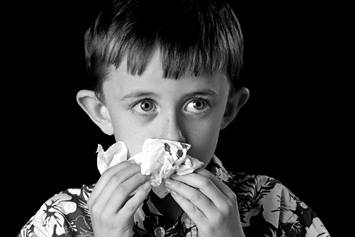Nosebleeds
Nosebleeds are common in children and usually harmless. They happen when a small blood vessel in the nose bursts. Nosebleeds can be treated at home
What Are Nosebleeds?
Most nosebleeds are a nuisance and stop within 5 to 10 minutes. They usually do not cause enough blood loss to be serious in children who are otherwise healthy. Nosebleeds are common in children because delicate, small blood vessels line the nose and can easily break.
What Causes Nosebleeds?
Nosebleeds are most often caused by:
- nose picking or scratching the inside of the nose
- rubbing the nose often
- dry air - Home heating systems may dry the air in your home and also dry the lining of the nose.
- getting hit in the nose or putting an object inside it
- blowing too hard
- colds or allergies
- abnormal tissue (skin) growth inside, such as polyps
Frequent nosebleeds within a few days are usually from the spot where a clot has formed and then comes off.
How to Stop a Nosebleed
Here are a few things you can help your child do to stop a nosebleed. Tell your child to:
- Try to be quiet and calm. Talking, laughing or crying may cause more bleeding.
- Sit up and lean the head forward slightly. Do not lie down, lean back or put their head between their knees.
- Pinch the nostrils tightly closed at the soft part of the nose just below the nasal bone (bone at the top of the nose). For young children, you might need to do this for them.
- Breathe through the mouth.
- Hold the nostrils closed for 5 minutes. Time this with a clock or watch. If the bleeding has not stopped after a full 5 minutes, hold the nostrils closed for 5 more minutes. Call your child’s health care provider if bleeding does not stop after a total of 10 minutes of pinching the nostrils.
- Wet a washcloth or hand towel with cool water. Wring it out and press firmly to the nose and cheeks.
- Do not blow the nose or remove crusts for several hours. If your child needs to blow their nose, remind them to do it very gently. Blowing or wiping the nose may cause the bleeding to start again.
- Spit out any blood that collects in the mouth. Swallowing a large amount of blood may cause your child to have a stomachache or vomit (throw up).
How to Help Prevent Nosebleeds
- Fingernails should be cut short to prevent scratching the inside of the nose.
- Keep fingers and objects out of the nose. Avoid rubbing the nose.
- Teach your child to blow their nose gently.
- Use a cool vaporizer or a humidifier in your child’s bedroom at night, especially during the winter. Be sure to clean the machine once a week.
- Smear a very thin coat of nasal ointment inside each nostril 2 to 3 times a day, especially at bedtime, for 2 weeks during the dry season. Petroleum jelly ointments, such as Vaseline® or Aquaphor® work best. This will keep the lining of the nose moist.
- For colds or a stuffy nose, use a saline nose spray – 2 sprays to each nostril, 2 or more times a day.
More About Nosebleeds
- If your child takes aspirin, an anticoagulant (anti-clotting) medicine or uses nasal sprays for allergies, be sure to tell the health care provider how often the nosebleeds happen.
When to Call Your Child's Health Care Provider
- The nosebleed does not stop after 10 minutes of pressure.
- Your child:
- has a nosebleed after an accident or being hit in the face.
- has a clotting disorder, blood in their urine or bruises easily.
- becomes dizzy, pale or has any problems breathing.
Helping Hands Patient Education Materials
Written and illustrated by medical, nursing and allied health professionals at Nationwide Children's Hospital, Helping Hand instructions are intended as a supplement to verbal instructions provided by a medical professional. The information is periodically reviewed and revised to reflect our current practice. However, Nationwide Children's Hospital is not responsible for any consequences resulting from the use or misuse of the information in the Helping Hands.
HH-I-84 | ©1979, revised 2021, Nationwide Children’s Hospital



